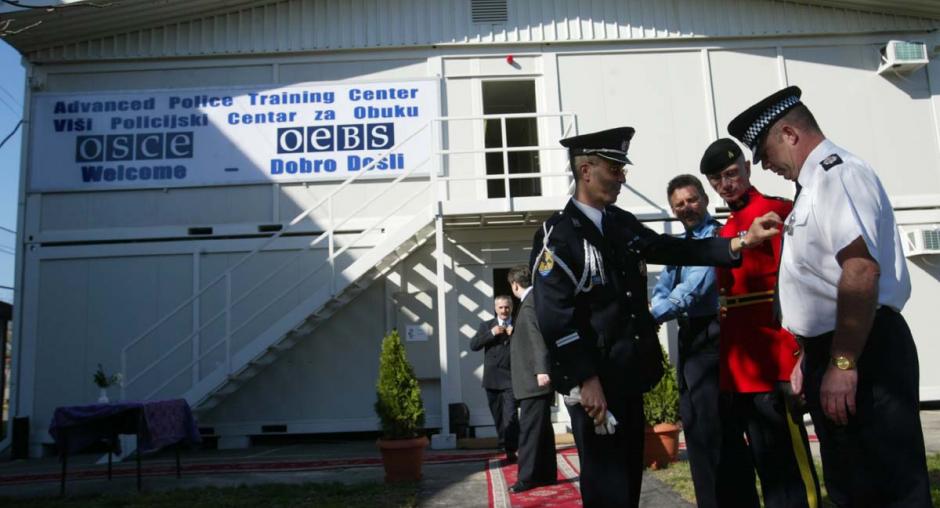Multi-ethnic police training in southern Serbia
A new multi-ethnic police training programme in southern Serbia, jointly organized by the OSCE and Serbian Interior Ministry, brings Albanian and Serb police officers together on patrol in Presevo, Bujanovac and Medvedja.
'Abdulah and Slobodan on patrol'
What was until recently unimaginable has now become a reality -- an ethnic Albanian police officer and his Serbian colleague carrying out a joint patrol in one of the municipalities of southern Serbia.
Abdulah and Slobodan, his Serbian colleague, both graduated from the multi-ethnic police training programme in southern Serbia, organized jointly by the OSCE and the Serbian Ministry of Interior.
Since the end of May this year, a total of 60 ethnic Albanians and Serbs have gone through the training, which is conducted by Serb and international instructors. Apart from general police courses, the training focuses on issues that are at the core of the OSCE mandate, such as respect for human rights as well as police ethics.
After the training, the graduates carry out regular police duties and joint patrols in the three municpalities in southern Serbia: Presevo, Bujanovac and Medvedja.
Bulding confidence
Abudulah, when asked how he would feel about arresting an Albanian or a Serb when on patrol in the streets of Presovo, his home village, responds that he does not think about arresting an ethnic Albanian or a Serb, but a criminal "and that criminals all speak the same language and understand each other very well."
Slobodan, who listens to this conversation, nods in agreement and corrects a journalist using the present tense when asking about the problems in southern Serbia resulting from the activities of armed Albanian rebels. She should use the past tense instead, he insists.
The party organized for the graduates that night turned out be a success. Serb and ethnic Albanian participants in the course celebrated their graduation sharing music and early drinks until the early morning hours.
Background
The start of the OSCE's involvement in the southern part of Serbia goes back to the time when NATO decided to hand back to the Yugoslav security forces control over the remaining parts of the Ground Safety Zone, the five-km buffer zone around Kosovo in which armed Albanian rebels had been operating for some time.
To contribute to the stability and security in the area, it was decided that multi-ethnic police officers, upon completion of joint training, would be deployed to the existing police force in southern Serbia, with the aim of re-balancing the ethnic Albanian presence in the police structures in Presevo, Bujanovac and Medvedja.
The first two phases of multi-ethnic police training, namely three five-day refresher courses and a five-week training programme for candidates with some police background, started on 21 May 2001 and were concluded on 14 July. Meanwhile, the OSCE Mission and the Serbian Ministry of Interior were preparing for the third phase of the training programme, involving entirely new recruits.
Third phase begins
After a selection procedure, carried out jointly by representatives of all interested parties (Serbs, Albanians and the OSCE), the third phase of the multi-ethnic police training started on 6 August. It will consist of four separate courses, each lastings 12 weeks and comprising up to 100 future police officers. More than 500 candidates submitted their applications for the training.
All the courses are taught in a police training centre in Mitrovo Polje, which is reserved exclusively for this purpose until May 2002. By that time, 400 new police officers will have been trained of which more than half will be of Albanian ethnicity.
"I am convinced that this centre will soon provide training for police officers to be deployed in other minority areas and hope that the contents of this course will ultimately find their place in national police training", said Ambassador Sannino.
Both Abdulah and Slobodan were proud of their diplomas and showed them to the Ambassador Sannino; marked "me sukses" for Abdulah and "uspesno" in Slobodan's case. In whichever language, this means "successfullly".

